The average cost of Chemotherapy in Sharjah approximately ranges between USD 2060/Session to USD 2560/Session
Treatment cost
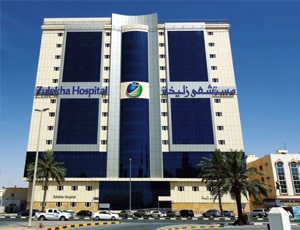
Types of Chemotherapy in Zulekha Hospital Sharjah and its associated cost
| Treatment Option | Approximate Cost Range (USD) | Approximate Cost Range (AED) |
|---|---|---|
| Chemotherapy (Overall) | 913 - 2870 | 3275 - 10443 |
| Standard Chemotherapy | 909 - 2042 | 3371 - 7561 |
| Targeted Therapy | 1355 - 2464 | 4964 - 9226 |
| Immunotherapy | 1699 - 2858 | 6161 - 10322 |
| Hormone Therapy | 991 - 2008 | 3755 - 7451 |
| Intrathecal Chemotherapy | 456 - 906 | 1672 - 3370 |
| Intra-arterial (IA) Chemotherapy | 913 - 1677 | 3345 - 6195 |
DOCTORS IN 10 SPECIALITIES
FACILITIES & AMENITIES

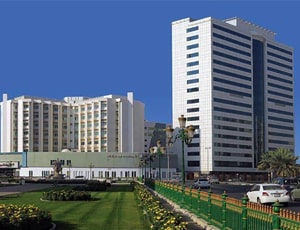
Types of Chemotherapy in NMC Royal Hospital Sharjah and its associated cost
| Treatment Option | Approximate Cost Range (USD) | Approximate Cost Range (AED) |
|---|---|---|
| Chemotherapy (Overall) | 910 - 2867 | 3284 - 10547 |
| Standard Chemotherapy | 908 - 2059 | 3249 - 7294 |
| Targeted Therapy | 1358 - 2477 | 4971 - 9153 |
| Immunotherapy | 1654 - 2763 | 6222 - 10118 |
| Hormone Therapy | 997 - 1990 | 3753 - 7556 |
| Intrathecal Chemotherapy | 446 - 903 | 1619 - 3347 |
| Intra-arterial (IA) Chemotherapy | 901 - 1656 | 3347 - 6242 |
DOCTORS IN 11 SPECIALITIES
FACILITIES & AMENITIES
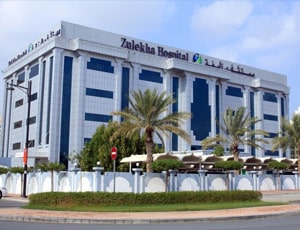
Types of Chemotherapy in Zulekha Hospital Dubai and its associated cost
| Treatment Option | Approximate Cost Range (USD) | Approximate Cost Range (AED) |
|---|---|---|
| Chemotherapy (Overall) | 910 - 2822 | 3285 - 10402 |
| Standard Chemotherapy | 908 - 2053 | 3237 - 7380 |
| Targeted Therapy | 1343 - 2462 | 4946 - 9044 |
| Immunotherapy | 1697 - 2822 | 6311 - 10105 |
| Hormone Therapy | 993 - 1981 | 3794 - 7327 |
| Intrathecal Chemotherapy | 457 - 916 | 1643 - 3275 |
| Intra-arterial (IA) Chemotherapy | 897 - 1659 | 3269 - 6159 |
DOCTORS IN 10 SPECIALITIES
FACILITIES & AMENITIES
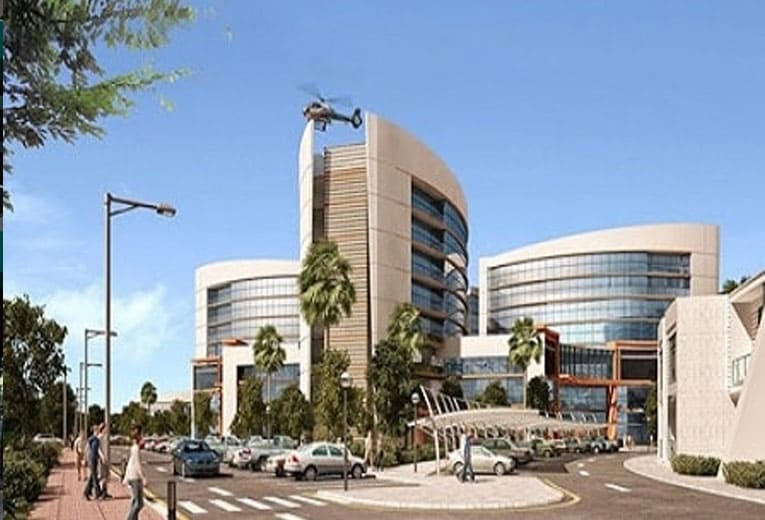
Types of Chemotherapy in Burjeel Medical City and its associated cost
| Treatment Option | Approximate Cost Range (USD) | Approximate Cost Range (AED) |
|---|---|---|
| Chemotherapy (Overall) | 897 - 2796 | 3230 - 10137 |
| Standard Chemotherapy | 903 - 1999 | 3317 - 7519 |
| Targeted Therapy | 1333 - 2492 | 4987 - 9213 |
| Immunotherapy | 1721 - 2862 | 6143 - 10416 |
| Hormone Therapy | 1000 - 2019 | 3776 - 7547 |
| Intrathecal Chemotherapy | 443 - 907 | 1621 - 3271 |
| Intra-arterial (IA) Chemotherapy | 889 - 1653 | 3310 - 6278 |
DOCTORS IN 13 SPECIALITIES
FACILITIES & AMENITIES
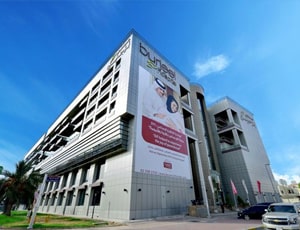
Types of Chemotherapy in Burjeel Hospital, Abu Dhabi and its associated cost
| Treatment Option | Approximate Cost Range (USD) | Approximate Cost Range (AED) |
|---|---|---|
| Chemotherapy (Overall) | 889 - 2867 | 3236 - 10501 |
| Standard Chemotherapy | 884 - 2035 | 3273 - 7384 |
| Targeted Therapy | 1367 - 2491 | 4905 - 9027 |
| Immunotherapy | 1703 - 2870 | 6219 - 10538 |
| Hormone Therapy | 996 - 2034 | 3737 - 7272 |
| Intrathecal Chemotherapy | 441 - 920 | 1642 - 3326 |
| Intra-arterial (IA) Chemotherapy | 896 - 1659 | 3274 - 6090 |
DOCTORS IN 9 SPECIALITIES
FACILITIES & AMENITIES
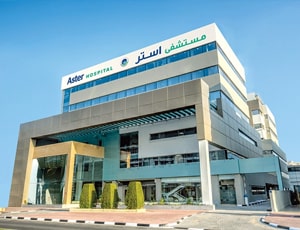
Types of Chemotherapy in Aster DM Healthcare and its associated cost
| Treatment Option | Approximate Cost Range (USD) | Approximate Cost Range (AED) |
|---|---|---|
| Chemotherapy (Overall) | 905 - 2814 | 3303 - 10511 |
| Standard Chemotherapy | 909 - 2044 | 3247 - 7430 |
| Targeted Therapy | 1347 - 2480 | 5043 - 9191 |
| Immunotherapy | 1690 - 2848 | 6190 - 10160 |
| Hormone Therapy | 991 - 2058 | 3672 - 7307 |
| Intrathecal Chemotherapy | 457 - 889 | 1627 - 3266 |
| Intra-arterial (IA) Chemotherapy | 894 - 1652 | 3356 - 6316 |
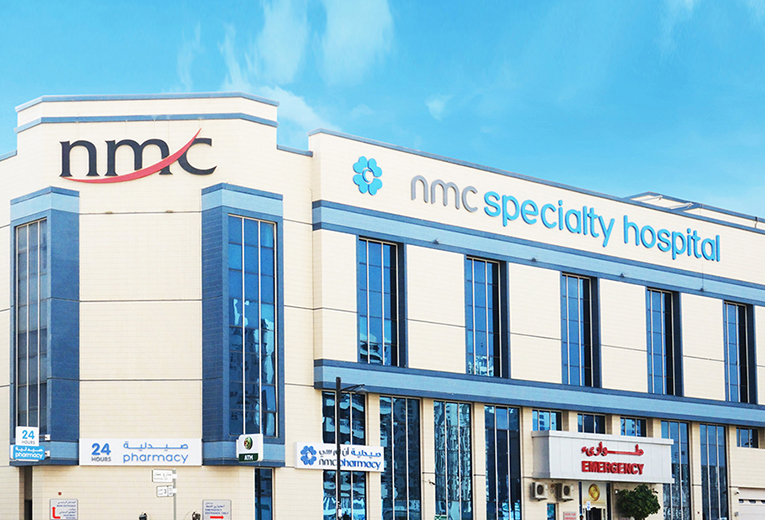
Types of Chemotherapy in NMC Specialty Hospital, Al Nahda and its associated cost
| Treatment Option | Approximate Cost Range (USD) | Approximate Cost Range (AED) |
|---|---|---|
| Chemotherapy (Overall) | 908 - 2853 | 3339 - 10413 |
| Standard Chemotherapy | 907 - 2012 | 3270 - 7336 |
| Targeted Therapy | 1352 - 2510 | 4933 - 8947 |
| Immunotherapy | 1723 - 2768 | 6142 - 10191 |
| Hormone Therapy | 992 - 2068 | 3772 - 7573 |
| Intrathecal Chemotherapy | 452 - 887 | 1660 - 3361 |
| Intra-arterial (IA) Chemotherapy | 905 - 1685 | 3263 - 6129 |
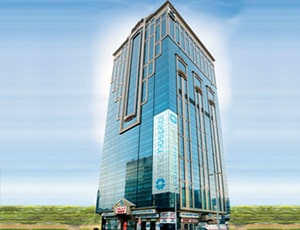
Types of Chemotherapy in NMC Specialty Hospital and its associated cost
| Treatment Option | Approximate Cost Range (USD) | Approximate Cost Range (AED) |
|---|---|---|
| Chemotherapy (Overall) | 918 - 2844 | 3234 - 10450 |
| Standard Chemotherapy | 884 - 2003 | 3358 - 7455 |
| Targeted Therapy | 1356 - 2475 | 4874 - 9152 |
| Immunotherapy | 1657 - 2864 | 6118 - 10404 |
| Hormone Therapy | 1003 - 2031 | 3715 - 7511 |
| Intrathecal Chemotherapy | 456 - 891 | 1620 - 3341 |
| Intra-arterial (IA) Chemotherapy | 910 - 1716 | 3342 - 6066 |
DOCTORS IN 10 SPECIALITIES
FACILITIES & AMENITIES
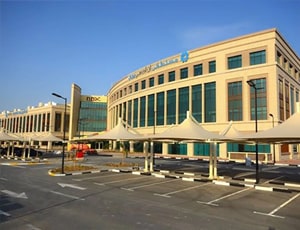
Types of Chemotherapy in NMC Royal Hospital, Khalifa City and its associated cost
| Treatment Option | Approximate Cost Range (USD) | Approximate Cost Range (AED) |
|---|---|---|
| Chemotherapy (Overall) | 903 - 2777 | 3325 - 10365 |
| Standard Chemotherapy | 916 - 2028 | 3251 - 7533 |
| Targeted Therapy | 1346 - 2473 | 4894 - 9113 |
| Immunotherapy | 1707 - 2828 | 6074 - 10541 |
| Hormone Therapy | 1017 - 2045 | 3654 - 7319 |
| Intrathecal Chemotherapy | 451 - 884 | 1625 - 3290 |
| Intra-arterial (IA) Chemotherapy | 880 - 1725 | 3303 - 6271 |
DOCTORS IN 11 SPECIALITIES
FACILITIES & AMENITIES
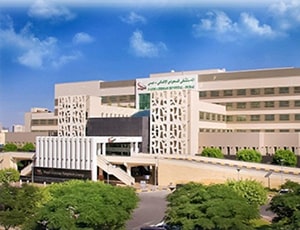
Types of Chemotherapy in Saudi German Hospital and its associated cost
| Treatment Option | Approximate Cost Range (USD) | Approximate Cost Range (AED) |
|---|---|---|
| Chemotherapy (Overall) | 907 - 2825 | 3263 - 10156 |
| Standard Chemotherapy | 890 - 2039 | 3300 - 7473 |
| Targeted Therapy | 1341 - 2463 | 4846 - 9165 |
| Immunotherapy | 1680 - 2851 | 6083 - 10203 |
| Hormone Therapy | 990 - 2037 | 3759 - 7582 |
| Intrathecal Chemotherapy | 445 - 881 | 1679 - 3238 |
| Intra-arterial (IA) Chemotherapy | 912 - 1689 | 3237 - 6318 |
DOCTORS IN 9 SPECIALITIES
FACILITIES & AMENITIES
Chemotherapy is a category of standardized drug administration of various types for the treatment of cancer. With a curative intent, some combinations of drugs are administered to a patient to prolong their life and also to bring about a reduction in the symptoms shown by the patient. Chemotherapy treatment is considered to be one of the major categories of medical oncology. Many people around the world are prescribed to undergo chemotherapy treatment instead of undergoing a surgical procedure. But many are frightened with the side effects of this treatment as it is believed to reduce the quality of life of the patients.
Chemotherapy is a procedure where non-specific intracellular poisons are used, which are specifically related to preventing the process of mitosis or the natural cell division of the cancerous cells. This technique rather excludes those agents that are responsible for selective extracellular growth signal blockade (signal transduction blockers). If spoken about these agents used in chemotherapy, it has been found that most of them are cytotoxic in nature due to their property of interfering with natural mitosis. However, the cells of cancer can differ widely in terms of showing susceptibility to these administered agents.
Chemotherapy can be defined as a way of mass destruction of stress cells, which would eventually lead to the death of the cells when apoptosis is initiated. The commonly known side effects of chemotherapy can be traced back to the process of damaging normal non-cancerous cells, which are in the process of rapid division. They are sensitive to anti-mitotic drugs that are being administered to the patient and such cells may include the cells of the hair follicles, digestive tract lining, and bone marrow. But nowadays treatment options have undergone a lot of modification by which these side effects can be well countered.
Various options of drugs are available to treat different types of cancer including the following:
Alkylating agents: These kinds of agents prove to be extremely beneficial during the cell’s resting phase. The various kinds of alkylating agents that are employed in chemotherapy treatment include the following:
Nitrosoureas are unique from the rest for choices in chemotherapy treatment due to their ability to cross the blood-brain barrier and treating tumors of the brain.
Plant alkaloids: Plant alkaloids employed for chemotherapy treatment are derived from plants. These include vinca alkaloids, taxanes, podophyllotoxins, and camptothecan analogs. The plant alkaloids are cell cycle specific agents, which enables them to attack the dividing cells in various stages of their division cycle.
Antimetabolites: This kind of chemotherapy treatment involves substances that are similar in composition to the normal substances present in the cell. When these substances get incorporated in the process of cellular metabolism, then the cell is no longer able to divide. They are also cell cycle specific and can be classified further according to the substance in the cell with which they interfere.
Topoisomerase inhibitors: When the topoisomerase enzymes in the body ( topoisomerase I and II) are inhibited as a result of chemotherapy drugs, then those drugs are referred to as topoisomerase inhibitors. During the chemotherapy, the topoisomerase enzymes are responsible for controlling structural manipulation of the DNA which is necessary for the purpose of replication.
Miscellaneous antineoplastics: Different types of drugs make each chemotherapy treatment process unique. Enzymes, retinoids, adrenocortical steroid inhibitor, ribonucleotide reductase inhibitor or antimicrotubule agents can be used as chemotherapy drugs.
Some of the chemotherapy drugs are involved in damaging the cell at the time of splitting while others do their jobs when the gene copies are being made by the cell prior to division. The cells that are in resting phase are very less likely to get damaged. Different kind of drugs damage the cells at different stages and hence a combination of various drugs will increase the chance of damaging more number of cancer cells.
Chemotherapy drugs can be given in a variety of ways. At times due to the destructive nature of stomach enzymes, some of the drugs are impossible to administer as pills. While for other drugs the effects are better realized when administered intravenously. Some of them can be injected into muscles while other can be given directly to the abdominal cavity and bladder directly.
They are administered orally and are available in various forms such as liquids, tablets, capsules, and pill. All these forms can be absorbed by the stomach or under the tongue. The protective coating around them is broken down by digestive juices of the stomach and then the medication is directly absorbed by the lining of the stomach. There are some which have a certain amount of time delay between the administration and the actual release of the medicine.
With the help of a short needle, the drug is administered into the region between the muscle and skin but it does not penetrate as far as the layer of muscles. They are used for some biologic response modifiers and support drugs of chemotherapy. If the platelet count of the patient is low, then it is less likely that such injections can cause any bleeding more than that in case if it was an intra muscular injection.
In this case, the injection penetrates the muscle layer and a large needle has to be used for this so that the medication gets deposited in the tissues of the muscle. Most chemotherapy cannot be implemented via intramuscular injection owing to its harshness. People with low platelet counts are not advised with this due to the possibility of bleeding within the muscle.
This also gets absorbed rapidly in the circulation system in the body. It offers more flexibility, thus making it more common. Continuous infusions are ensured through this method for days and weeks if required. Some of the types of intravenous infusions include the following:
In this procedure, the drugs are meant to reach the cerebrospinal fluid. The blood-brain barrier stops many drugs to reach it and hence in two ways it can be done; one is the lumbar puncture and the other is Ommaya reservoir. A dome-shaped device with a catheter attached is placed in the subcutaneous layer on the scalp. It is threaded to the lateral ventricle of the brain. A small needle is placed through the ommaya reservoir to inject drugs. This is good for chemotherapy for leukemia.
In this case, the drug can be directly drained into the abdominal cavity, the general cavity surrounding the organs. The organs, as a result, get bathed in the medication before it gets absorbed into the tumor site.
Here the drug is given directly to the artery supplying blood to a tumor. This kind of treatment is beneficial for colon cancer, limb melanoma, pancreatic cancer, gastric cancer, and some other forms of cancer.
A urinary catheter is used to access the urinary bladder and useful for people suffering from superficially invasive bladder cancer.
This is the chemotherapy for lung cancer where the drug is administered in the pleural cavity to control malignant pleural effusions and used for symptom relief.
A gliadel wafer can be placed in the cavity after removal of tumor in the brain. It can be left for 2 or 3 weeks to ensure that all cancer cells are finally killed in the area surrounding the brain tumor site.
In this case, a cream is applied to the skin and used to treat cancerous lesions on the skin itself. Not used very commonly but used for treating skin cancer.
Ask your healthcare adviser for the best multiple options and choose the one that meets your expectations
On an average, Chemotherapy in Sharjah costs about $2010. JCI, TEMOS are just some of the accreditations which top hospitals in Sharjah hold where a Chemotherapy is conducted.
The Chemotherapy package cost in Sharjah varies from one hospital to another and may offer different benefits. The top hospitals for Chemotherapy in Sharjah covers all the expenses related to the pre-surgery investigations of the candidate. The Chemotherapy cost in Sharjah includes the cost of anesthesia, medicines, hospitalization and the surgeon's fee. A prolonged hospital stay due to delayed recovery, new diagnosis and complications after surgery may increase the cost of Chemotherapy in Sharjah.
There are many hospitals that perform Chemotherapy in Sharjah. The top hospitals for Chemotherapy in Sharjah include the following:
Upon discharge from the hospital after Chemotherapy in Sharjah, the patients are advised to stay for about 20 days for recovery. This duration of stay is recommended to complete all the necessary follow-ups and control tests to ensure that the surgery was successful.
Sharjah is undoubtedly one of the best cities for Chemotherapy in the world. It offers the best medical expertise and good patient experience at an affordable cost. there are a select few destinations that provide comparable quality of healthcare for the procedure. Some of such cities are:
Apart from the cost of Chemotherapy, the patient is also required to pay additionally for daily meals and guest house accommodation. These are the charges for daily meals and accommodation outside the hospital. The per day cost in this case may range from 60 USD.
The patient is supposed to stay at the hospital for about 1 Days after Chemotherapy surgery for monitoring and care. The patient is subjected to several biochemistry and radiological scans to see that everything is okay and the recovery is on track. After making sure that patient is clinically stable, discharge is planned.
The overall rating for hospitals providing Chemotherapy in Sharjah is 4.8. This rating is automatically calculated on the basis of several parameters such as the infrastructure of the hospital, quality of services, nursing support, and other services.
There are more than 2 Hospitals that offer Chemotherapy in Sharjah. These hospitals are approved to perform the surgery and have proper infrastructure to handle Chemotherapy patients. Additionally, these hospitals are known to comply with the international standards as well as local legal requirements for the treatment of patients.
Some of the most sought after doctors for Chemotherapy in Sharjah are: